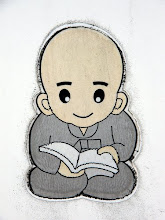
Tuesday, December 9, 2008
Monday, December 8, 2008
One-pointedness of mind
One-pointedness of mind: singleminded focus, particularly on the name of Amitabha Buddha. According to Pure Land teaching, this is an essential condition for rebirth at a high lotus grade. See also the following passage:
The Method of Hearing is in keeping with the fundamental principle that if one sense-organ is intensely concentrated, all the other five sense-organs would be also held still automatically. This is the most fundamental tenet of the reciting method, as said in the Surangama Sutra: "When the six sense-organs [five senses plus mind] are simultaneously held in concentration, there will be very pure thought in succession." (Hsu Heng Chi, What's Buddhism, p. 56.)
The Method of Hearing is in keeping with the fundamental principle that if one sense-organ is intensely concentrated, all the other five sense-organs would be also held still automatically. This is the most fundamental tenet of the reciting method, as said in the Surangama Sutra: "When the six sense-organs [five senses plus mind] are simultaneously held in concentration, there will be very pure thought in succession." (Hsu Heng Chi, What's Buddhism, p. 56.)
Practice is a cardinal point in Buddhist cultivation
A story concerning the famous T'ang Dynasty official and poet Po Chu-i illustrates this point.
One day, the official, passing along the road, saw a Zen monk seated on the branch of a tree preaching the Dharma. The following dialogue ensued: Official: "Old man, what are you doing up in that tree, in such a precarious position? One misstep, and you will fall to your death!" Monk: "I dare say, Your Lordship, that your own position is even more precarious. If I make a misstep, I alone may suffer; if you, as a high-ranking official, make a mistake in judgement, it can cost the lives of thousands." Po Chu-I, seated in this ornate sedan chair, was puzzled. He reflected for a moment before the parallel dawned on him. He then responded: "Not a bad reply. I'll tell you what. If you can explain the essence of Buddhism to me in one sentence, I'll become your disciple. Otherwise, we will go our separate ways, never to meet again." Monk: "What an easy question! Listen! The essence of Buddhism is to do no evil, do what is good and keep your mind pure." Official: "Is that all there is to it?" Even a child of three realizes that!" Monk: "True, a child of three may realize it, but even a man of eighty cannot practise these injunctions!"
One day, the official, passing along the road, saw a Zen monk seated on the branch of a tree preaching the Dharma. The following dialogue ensued: Official: "Old man, what are you doing up in that tree, in such a precarious position? One misstep, and you will fall to your death!" Monk: "I dare say, Your Lordship, that your own position is even more precarious. If I make a misstep, I alone may suffer; if you, as a high-ranking official, make a mistake in judgement, it can cost the lives of thousands." Po Chu-I, seated in this ornate sedan chair, was puzzled. He reflected for a moment before the parallel dawned on him. He then responded: "Not a bad reply. I'll tell you what. If you can explain the essence of Buddhism to me in one sentence, I'll become your disciple. Otherwise, we will go our separate ways, never to meet again." Monk: "What an easy question! Listen! The essence of Buddhism is to do no evil, do what is good and keep your mind pure." Official: "Is that all there is to it?" Even a child of three realizes that!" Monk: "True, a child of three may realize it, but even a man of eighty cannot practise these injunctions!"
Concentrate on a single method or school in order to achieve success
We may take up any Dharma for practice as long as it is agreeable to our interest and inclination, and since every Dharma is perfect and complete, therefore in the cause of cultivation, we should not think of changing from one Dharma to another, nor should we think that a certain Dharma may be more superior or inferior to the others. As no medicine may be called ... bad as long as it can cure, likewise, no Dharma may be said to be ... low as long as it is adaptable to its followers. (Hsu Heng Chi, What's Buddhism?, p. 62.)
Subscribe to:
Comments (Atom)

